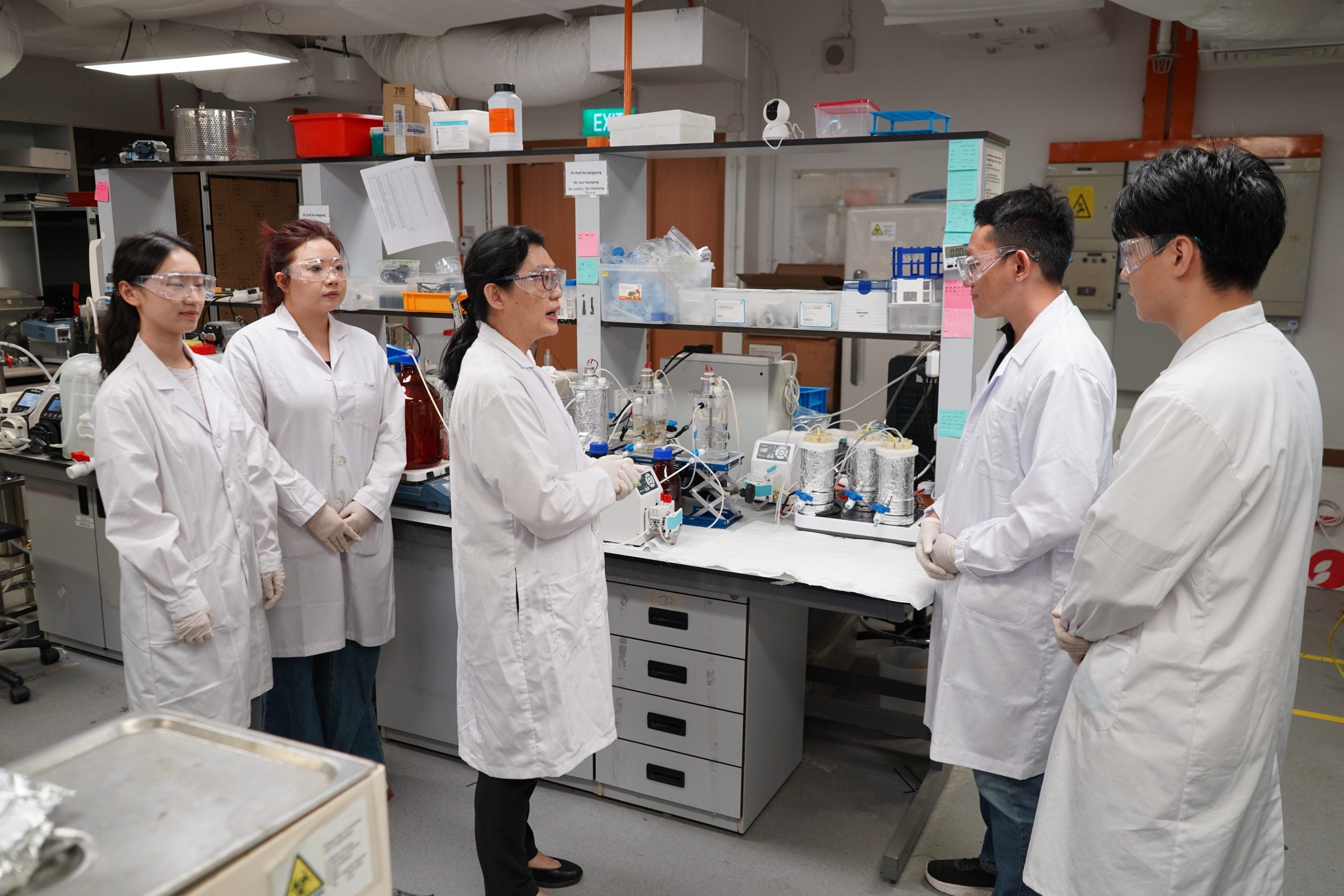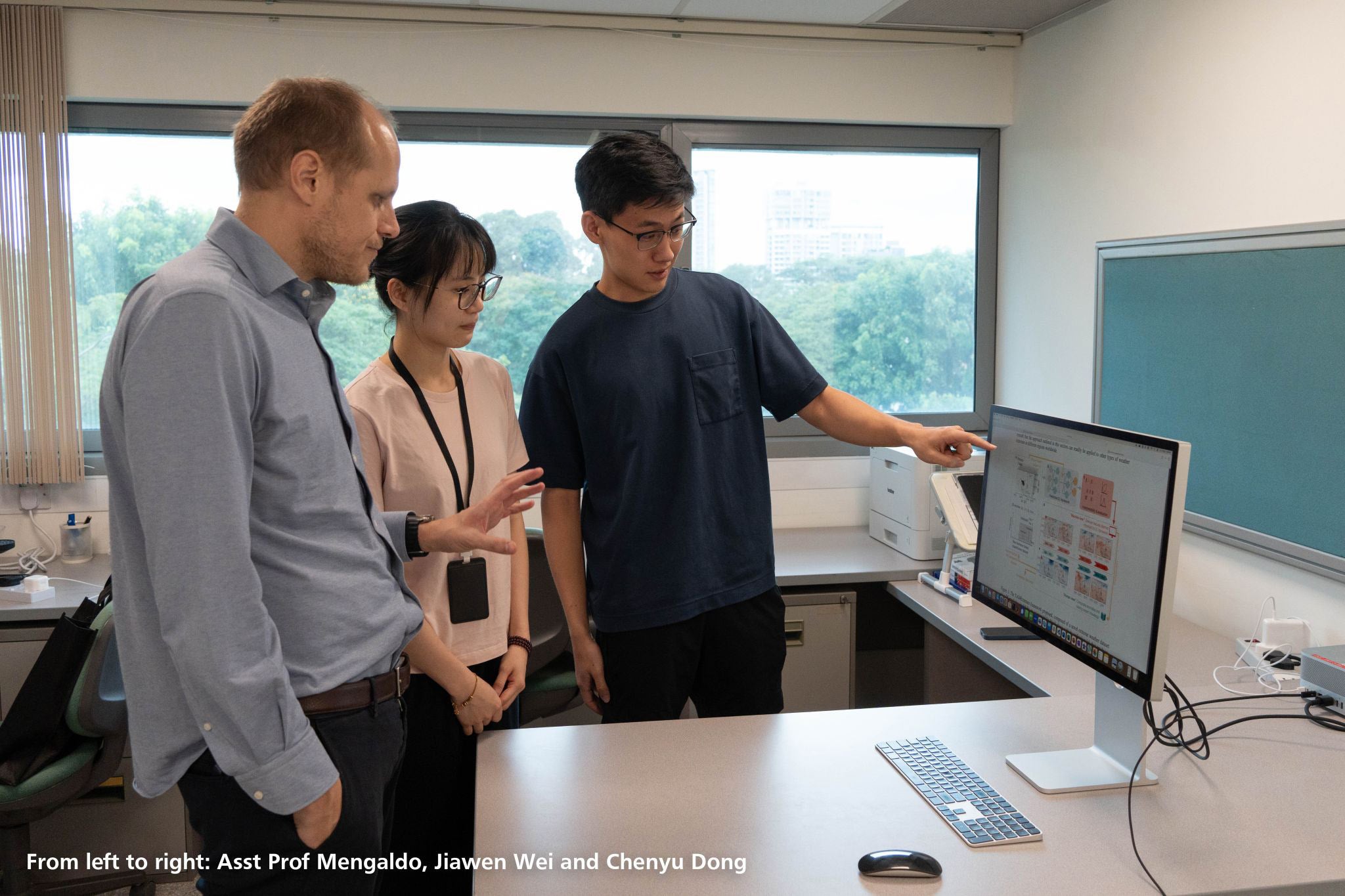RESEARCH IMPACT & COLLABORATIONS
Research teams awarded funding to drive robotics innovation

Four multidisciplinary research teams have been awarded funding under the inaugural NUS Robotics Seed Grant Programme, a new initiative by the College of Design and Engineering (CDE) that aims to advance robotics innovation through cross-disciplinary collaboration. The awarded projects include eight faculty from across CDE, as well as faculty from Computing, Medicine and Arts and Social Sciences.
Launched in early 2024 as part of the NUS Grand Challenge on Robotics Science and Engineering, the programme was developed following a series of workshops within the NUS community. These discussions identified five key research areas where robotics can have a transformative impact:
- Healthcare – Enhancing robotic capabilities in medical and assistive care
- Personalised medicine – Integrating robotics with tailored treatment approaches
- Workforce automation – Developing intelligent robotic systems for industry
- Personal assistance – Creating robots to support daily living
- Sustainable robotics – Designing eco-friendly robotic solutions
By funding projects in these domains, the programme fosters collaboration across faculties and encourages breakthroughs that push the boundaries of robotics research. Under the programme, the Advanced Robotics Centre (ARC) at CDE will provide dedicated space and resources to facilitate cooperation and ensure the research teams can work closely together.
Read more here: https://cde.nus.edu.sg/news-detail/research-teams-awarded-funding-to-drive-robotics-innovation/
MOU signed to enhance maritime geospatial technology

The NUS Centre of Excellence in Modelling and Simulation for Next Generation Ports (C4NGP) has signed an MOU with the Maritime and Port Authority of Singapore (MPA) to drive research and innovation in geospatial applications.
Hosted at CDE, C4NGP is a leading research centre focused on developing cutting-edge modelling and simulation capabilities to enhance Singapore’s port operations and competitiveness. Through the collaboration, MPA, C4NGP, and industry partners will explore how geospatial technology—using satellite data, real-time monitoring, and advanced analytics—can improve port efficiency, enhance risk management, and support sustainability efforts.
Read more here: https://cde.nus.edu.sg/news-detail/mou-signed-to-enhance-maritime-geospatial-technology/
Transforming treatment for diabetic patients

"In Singapore alone, an estimated 400,000 individuals live with diabetes, and every day an average of four people face the devastating reality of limb amputation due to these chronic wounds."
To tackle this problem, a research team led by Asst Prof Andy Tay (Biomedical Engineering) has developed innovative microneedle technologies that accelerate diabetic wound healing by delivering growth-stimulating proteins and removing harmful inflammatory compounds.
Using dissolvable microneedles to enhance the body’s natural healing process and sponge-like microneedles to extract damaging molecules, the research aims to transform treatment for diabetic wounds and could be applied to other chronic skin conditions.
Dr Le Zhicheng, who was a postdoctoral researcher with Asst Prof Tay at the time of the studies, was lead author of the two papers.
Read more: https://cde.nus.edu.sg/news-detail/microneedle-tech-to-accelerate-diabetic-wound-healing/
World Water Day: CDE innovates to conserve water amid climate challenges

"Climate change is a growing challenge in the modern world and its effects on water resources are complex and interconnected. Here at the Centre for Water Research we are dedicated to studying the impact of climate change on water treatment and developing innovative solutions to address these issues." - Professor Jiangyong HU (Civil & Environmental Engineering), Director at the Centre for Water Research (CWR).
As part of World Water Day 2025, we highlight the amazing research conducted at CWR which focuses on dealing with the impact of climate change on Singapore's water resources and treatment processes. From preventing cyanobacterial bloom in water bodies, to maintaining efficiency in water treatment in the face of rising temperatures, CWR is committed to enhancing water conservation efforts in Singapore and contributing to the sustainability of water resources in the face of a changing climate.
Read more about CWR's research here.
CDE researchers and collaborator's from Brown University, Centre for Climate Research Singapore and NVIDIA AI Technology Centre's publication listed by AI World as weekly top 10 notable research papers

CDE researchers Asst Prof Gianmarco Mengaldo, PhD students Jiawen Wei and Chenyu Dong, and collaborators from Brown University, Centre for Climate Research Singapore, and NVIDIA AI Technology Centre are using deep learning models to investigate the causes of extreme weather.
Their ongoing collaboration has resulted in their publication, XAI4Extremes: An interpretable machine learning framework for understanding extreme-weather precursors under climate change, listed by AI World as one of the week’s top 10 notable research papers!
As extreme weather events become more frequent and intense, enhancing our ability to predict them is crucial.
The researchers are investigating these weather events, namely heatwaves, using interpretable machine learning, specifically post-hoc interpretability methods applied to a binary time series classification deep learning (DL) framework they proposed. This approach produces relevance maps highlighting what input data the DL framework deemed important for its prediction.
The team will compare these maps with existing knowledge to see if they reveal new patterns that help us better understand the causes (also referred to as precursors) of extreme weather. These weather maps will also be organised by different multi-year periods to explore how climate change affects these precursors.
It is heartening to see collaborations such as this across organisations and involving young upcoming talents in research addressing some of the world’s most urgent climate concerns.
Jiawen, the paper's first author, says, “I have worked in interpretable machine learning and explainable AI (XAI) for the past two years. I am excited to start seeing the results of my research for scientific applications, and I look forward to contributing further to the intersection of XAI and science.”
Major Grants Awarded
The major grants (start date in March 2025) with total project value > $1M.
| Hosting Unit | Project Title | Funding Programme (Source of Funding) |
Principal Investigator | Co-Investigator |
| ECE | Modular Reconfigurable Mobile Robots (MR)2 | A*STAR Manufacturing, Trade and Connectivity (MTC) Industry Alignment Fund - Pre Positioning (IAF-PP) - 2024
(A*STAR) |
Ge Shuzhi | Ji Ruihang |
| MSE | Continue the scaling of electronic devices with transition metal dichalcogenide semiconductors | NRF Professorship – 2025
(NRF) |
Li Lain-Jong, Lance |




